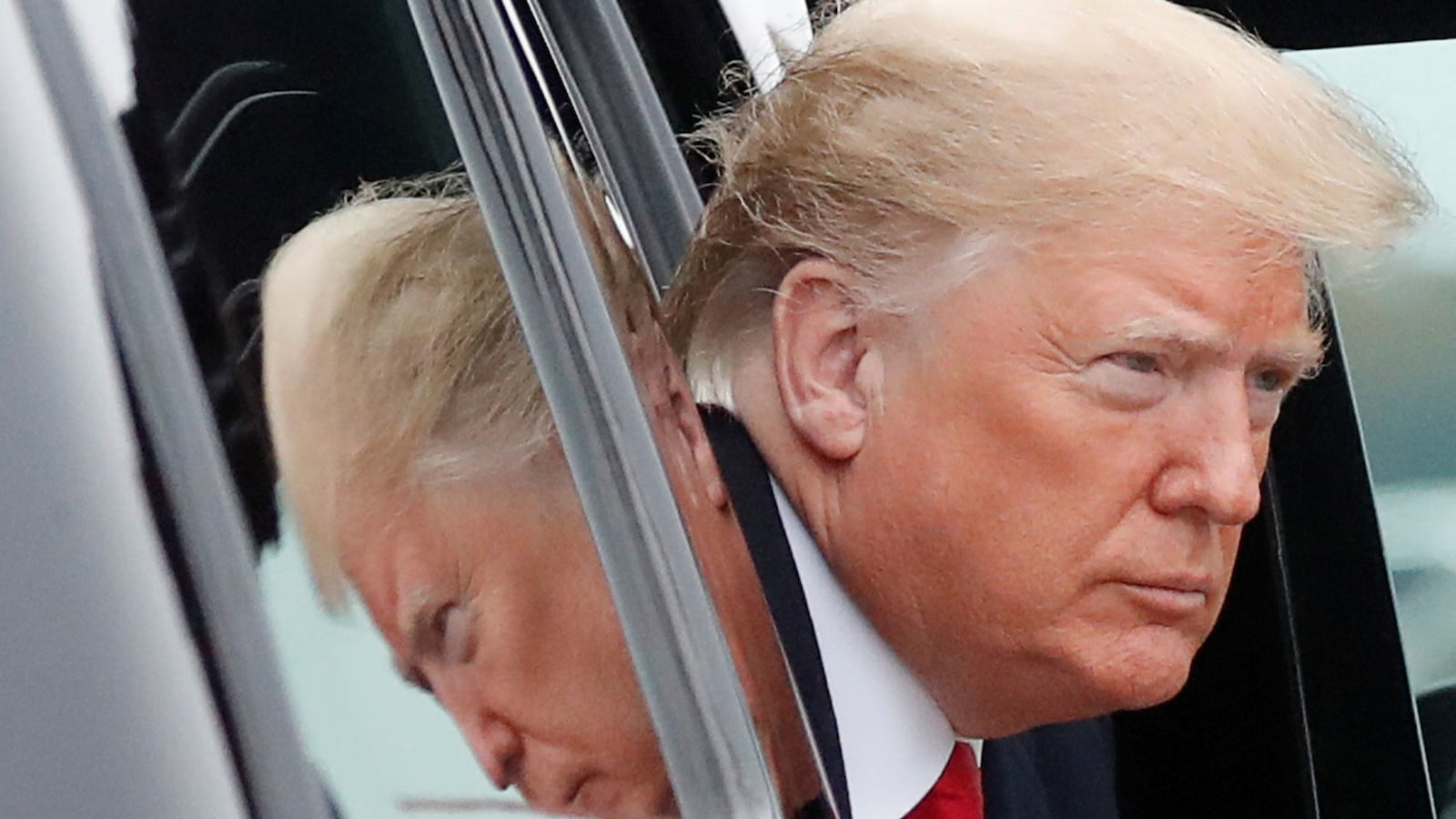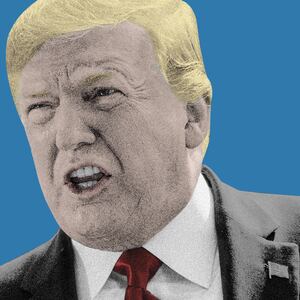Incidents of antisemitism rose 60 percent in the first year of Donald Trump’s presidency. The next two years saw two of the deadliest attacks against Jews in American history—the October 27, 2018 terrorist massacre at the Tree of Life synagogue in Pittsburgh and the April 29, 2019 attack on the Chabad center in Poway, California. Both were carried out by right-wing nationalists, with the same populist ideology.
And so Trump is finally taking action—against the Left.
In a remarkable executive order, an advance copy of which was released today, President Trump effectively amended Title VI of the Civil Rights Act, which prohibits “discrimination under any program or activity receiving Federal financial assistance,” to include antisemitism.
Yet the way the order does so is almost perversely ironic, in at least three ways.
First, Title VI only prohibits discrimination on the basis of “race, color, or national origin”—not religion. To cover antisemitism, the order implicitly redefines Jewishness as one of those categories, rather than as a religion. Arguably, this is a purely legal maneuver, shoehorning antisemitism into a statute that doesn’t really cover it. But it has already caused an uproar in the Jewish community, since it is, itself, antisemitic to suggest that Jews are a foreign nation or race.
While ostensibly trying to protect Jews from discrimination, the executive order provides yet another pretext for it.
Second, of course, the whole order is the latest transparent attempt by Trump to score political points with Jewish voters, especially right-leaning ones, like moving the American embassy in Israel to Jerusalem and breaking with the entire world on the illegality of West Bank settlements.
In 2016, only 23 percent of American Jews voted for Trump, but if that number creeps up to 25 percent, it could decide Florida in 2020.
Third, and most importantly, the order singles out not terrorism against Jews but that “students, in particular, continue to face anti-Semitic harassment in schools and on university and college campuses.” And since the order is about interpreting Title VI, it presumably may be used to cut off funding from university campuses that are deemed to be too tolerant of antisemitism.
But wait a minute. How many Jews have campus activists murdered in cold blood, exactly? Why is this executive order focusing on college sophomores boycotting Israeli hummus rather than radicalized white supremacists and others who commit actual acts of violence against actual people?
The answer to that question goes beyond well beyond Donald Trump, and indeed, includes organizations and politicians (including many Democrats) who usually oppose him.
For at least a decade now, the Anti-Defamation League and other leading Jewish groups have taken a new, broader, and frankly incoherent approach to defining what antisemitism even is.
Ever since the term “Anti-Semitism” was coined in 1879, it’s had certain key features: lies about Jewish power and control; slanders against Jews being disloyal outsiders; and stereotypes of Jewish greed, cunning, and manipulation.
Indeed, the term was invented by antisemites themselves, who sought to rebrand ancient hatred of Jews in terms of race—much as the Trump order does today. After all, the young Adolf Hitler wrote in 1919 that “the Jews are definitely a race, and not a religious community.”
Such antisemitism has skyrocketed among Trump’s supporters, who, for example, depict Jewish financier George Soros as a puppetmaster controlling the State Department, the news media, and even Black Lives Matter activists; and who chant “Jews Will Not Replace Us” at racist rallies, or, in Trump’s closing campaign ad of 2016, highlight Jewish members of the media or financial worlds as enemies of the people.
This is what antisemitism has been for 150 years, whether spouted by Nazis, Stalinists, Henry Ford, or Louis Farrakhan: part of populism, with Jews cast as the foreign "others" undermining the will of the volk, or Sovietskiy narod, or ‘real’ Americans, or whomever.
(The rabidly anti-Jewish and anti-white ideology of the Black Hebrew Israelites—which may have inspired yet another terrorist attack against Jews in Jersey City this week—is different. It holds that African Americans are the true Biblical Hebrews and Jews are evil usurpers.)
Lately, however, the ADL, the U.S. State Department, and others have abandoned this definition of antisemitism and expanded it to mean basically anything bad anyone says about any Jews—or more specifically, in the words of the definition adopted by today’s order, “a form of prejudice or discrimination directed toward Jews as individuals or as a group."
More importantly, the definition includes “denying the Jewish people their right to self-determination, e.g., by claiming that the existence of a State of Israel is a racist endeavor.”
That last phrase is particularly problematic, since it is a common claim made by supporters of the Anti-Israel Boycott, Divestment, and Sanctions (BDS) movement—including on many college campuses. Under the new executive order, a university that tolerated such claims could be in danger of losing its federal funding.
But wait a minute.
Is it bigotry to describe a state that treats people differently on the basis of their ethnicity as being a racist endeavor? That may be accurate or inaccurate, but it’s a statement of political opinion, not hate.
For that matter, plenty of states are called racist endeavors, including our own. Isn’t the original sin of America, according to some on the Left, the racist genocide of its indigenous people and the racist enslavement of people of African descent? Agree or disagree, that looks more like a political opinion than bigotry.
On the contrary, it’s intended to call out bigotry.
And why is “denying the Jewish people their right to self-determination” a form of Title VI discrimination but not denying the Uighur, Navajo, or Kurdish people theirs? Should a university be penalized for sponsoring a program with the Chinese government? Or the State of Arizona?
The fact is, anti-Zionism is a political ideology, not an antisemitic outburst. But that distinction has ceased to matter politically.
Not just Jewish Republicans but the mainstream of the institutional Jewish community has bought the line that BDS is antisemitism. And from there it’s an easy jump to prohibit universities from tolerating it.
And so we are living in a topsy-turvy world, in which the president of the United States condemns fake antisemitism while producing real antisemitism.
Not only is nationalist populism intrinsically antisemitic, but time and time again, Trump and his surrogates have crossed the line into overtly antisemitic statements, like the light-hearted antisemitic banter Trump engaged in before the Israeli American Council last week, joking that “a lot of you are in the real estate business because I know you very well. You’re brutal killers. Not nice people at all. But you have to vote for me; you have no choice. You’re not going to vote for Pocahontas, I can tell you that. You’re not going to vote for the wealth tax.”
These lines were met with laughter by the mostly-Jewish audience. But the canard that Jews are wealthy and greedy is part of classical antisemitism.
So is the claim, which Trump repeated a few months ago, that Jews are more loyal to Israel than to America, saying, “I think any Jewish people that vote for a Democrat, I think it shows either a total lack of knowledge or great disloyalty.”
Of course, he meant this as a compliment to the “loyal” Jews who vote for Israel’s interests first (and thus vote Republican). But the same dual “loyalty” that Trump praises, white nationalists punish by death.
Trump, after all, is an anomalous nationalist. Presumably because of his many Jewish associates and family members, he seems to feel it’s OK that Jews are greedy rich people whose primary loyalty is to Israel. The guy just loves the Jews.
But the next Trump, whoever he is, probably won’t. And God help us then.







